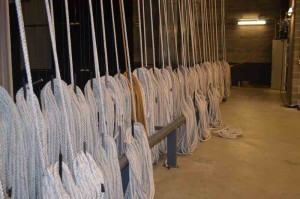Did You Know – Break a Leg and Other Theatre Superstitions

The fly floor of a theatre. Don’t whistle while you work or mention the Scottish Play, otherwise you may “break a leg”. Photo by Paul Sanow, ASTC.
Traditions abound in the theatre. Superstitions are passed on through generations of performers and technicians. Why does one not whistle on a stage? One answer is that a bosun’s whistle on a sailing ship signaled the command to change the setting of the sails. Theatre rigging with its ropes, pulleys, battens and belaying pins is thought to have been inherited from centuries’ old sailing technology along with sailors who were perhaps the first theatre rigging operators. Therefore, an inadvertent whistle could result in an inadvertent scenery change.
We all have heard the expression, “Break a leg!” The theatrical superstition prevails in that wishing a performer “good luck” is considered bad luck. So, “break a leg” is considered a wish for success.
The “Scottish Play” is used in reference to Shakespeare’s Macbeth. Theatrical tradition says that speaking the name Macbeth inside a theatre, other than when required in a rehearsal or performance of the play, will result in immediate disaster. To avoid imminent disaster, the term “the Scottish Play” is used instead.
So, break a leg, but don’t whistle on the stage of the “Scottish Play”.
By Robert Long, FASTC
Disclaimer: Any views or opinions expressed in this article are solely those of the author and do not necessarily represent those of the American Society of Theatre Consultants, nor the author’s employer. This article is for general information only and should not be substituted for specific advice from a Theatre Consultant, Code Consultant, or Design Professional, and may not be suitable for all situations nor in all locations.


